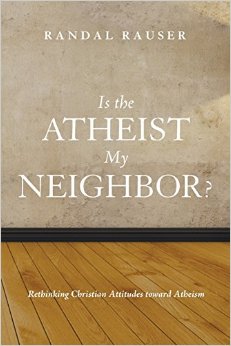Podcast: Play in new window | Download
Subscribe: Spotify | Email | RSS
This says that all atheists are fools, right? Pastor John Hagee says that “Atheism is bankrupt and empty. It’s brain dead!” Others have said that all atheists because they hate God and want to sin with impunity. Is this what the Bible teaches? Is this true?
In this conversation Dr. Rauser and I discuss
- why Dr. Rauser wrote this book
- what “atheism” means
- the “Rebellion Thesis” about the origin of atheistic belief – what Dr. Rauser diagnoses as a or the mainstream Christian view about atheists in recent times
- whether Psalm 14 or Romans 1 supports the Rebellion Thesis
- what the Rebellion Thesis implies about agnostics and doubting Christians
- how Christians should be hospitable towards atheists
- whether all atheists really believe in God
- factors which may affect how blameworthy an atheist is for his atheism
You can also listen to this episode on Stitcher or iTunes (please subscribe, rate, and review us in either or both – directions here). It is also available on YouTube (scroll down – you can subscribe here). If you would like to upload audio feedback for possible inclusion in a future episode of this podcast, put the audio file here.
You can support the trinities podcast by ordering anything through Amazon.com after clicking through one of our links. We get a small % of your purchase, even though your price is not increased. (If you see “trinities” in you url while at Amazon, then we’ll get it.)
Links for this episode:
- Dr. Rauser’s blog: The Tentative Apologist
- Dr. Rauser’s books
- podcast 102 – Dr. Brian Leftow on perfect being theology
- trinities posts on self deception
- This week’s thinking music is “Ecstasy is not The Enemy” from the album “the wilderness i want” by Jim Rooster.



Excellent discussion. Thanks!
This was a good conversation. (I discovered this podcast some time back via Randal’s blog, BTW.) I enjoyed the discussion about the nature of self-deception. While as a Christian I say I believe God is all-wise and all-loving, and it certainly seems to me that I do believe it, I often don’t act the way one would expect a person to act who believes that way. (I’m a chronic worrier, for example — surely a bizarre habit for someone who believes a benevolent power is in charge of the universe.) If an atheist were to say, “See? You don’t really believe in God. Deep down, you’re just an atheist in denial”, I would find him both obnoxious and (IMO) wrong. However, I still have to stop and think….
I don’t recall Randal going into it in his book, but I wonder to what extent the prevalence of the Rebellion Thesis stems simply from an attempt to account for nonbelief in the first place… a means of avoiding divine hiddenness: “God’s not hidden, you just don’t want to see him.” I think the argument against God from Divine Hiddenness is the one I personally find most challenging, and the existence of intelligent, non-hostile, seemingly open atheists helps put an edge on that argument. I certainly see how the Rebellion Thesis could help one blunt that edge.
I think many People put too little emphasis on the social ideology and culture in which they live. For example Charles Taylor has argued that atheism is basically a Christian Herasy. Christianity Dis-Enchanted the Universe, naturalizing it, asigning divinity to only one trascendental reality rather than nature being full of divinity as it was in paganism, and from there it’s an easy step to just get rid of the transcendental reality and end With naturalism. But for that you need to grow up in a culture where the ruling ideology allows that.
David Bently Hart has also said that Atheism is in a way an ideological child of Capitalism. Capitalism basically assigns market value as the only value, everything is measured and must be measurable to matter, from that you get a society obsessed With measurable value, With Control over nature and materialism, so then you og to the question of God and for someone who grew up in a society where all value is measured and measurable, you don’t really have an ideological room for God who is by definition unmeasurable.
I would argue that the rebellion theory holds, not so much for individuals, but for social ideologies and cultures. A kid who grows up in a society that puts the individual, market value and empirical science as the ultimate authorities, is obviously going to come to certain conclusions unless otherwise instructed. The rebellion is in the culture and ideology, which is built up by individuals, on top of previous ideologies, and in turn which creates individuals shaped by it.
Interesting, I would have never thought about seeing Romans 1 as self-deception warning that cuts both ways. If its possible for theists to be self- deceived in their theism, that would seem to be the best explanation for the state of the church in the U.S
Comments are closed.